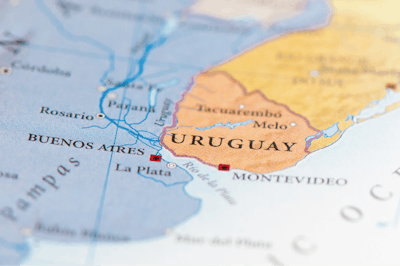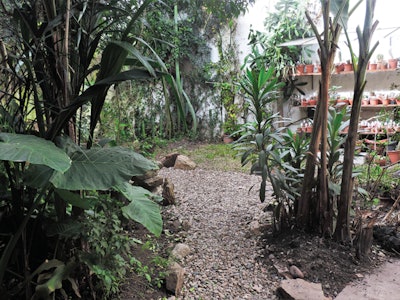
Uruguay became the first nation in the world to legalize cannabis—authorizing cultivation in 2014 and sales of the drug through pharmacies this summer—but implementing a legal and financial framework has proven difficult. Uruguay depends on the United States for banking and financial services, and many banks are unwilling to provide for cannabis-related business due to the illegal status of cannabis in the States.
“It seems that the local banks cannot keep the pharmacies’ accounts,” wrote Eduardo Blasina, founder of the Montevideo Cannabis Museum in Uruguay, in an email to Cannabis Business Times. “We have solved so many problems to become legal that we are confident that we will be able to solve just another one. It seems that pharmacies selling cannabis will only be allowed to work with cash and no bank.”
Pharmacies are currently forced to manage their own finances because Uruguayan banks are concerned about the consequences of dealing with money from cannabis sales.

“Some of the pharmacies that did opt to sell cannabis, many of them had their bank accounts close,” said Frank Robison, an attorney at Vicente Sederberg representing cannabis entrepreneurs. “Not just by American banks, but regional banks and other international banks.” Robison is close to the issues facing Uruguay, and was recently invited to meet with the President of the Central Bank of Uruguay in Washington, D.C.
According to Robison, the perceived risk isn’t worth it for many banks.
Steve Schain is an attorney for Hoban Law Group, an international law firm representing legal cannabis and hemp. He contrasted the banking challenges surrounding U.S. cannabis businesses as internal, tempered by issues of legality and profitability. Meanwhile, Uruguay’s challenges stem from external perceptions impacting its worldwide credit rating.
Beyond having to comply with Bank Secrecy Act (BSA) and money laundering concerns, adhering to the United States’ Treasury Department Financial Crimes Enforcement Network guidance (FinCEN) on providing financial services to marijuana-related businesses consistent with BSA obligations imposes enormous costs on American financial institutions, making them reticent to do business with these pharmacies. Conversely, Uruguayan regulators and banks are concerned about how their country is perceived and how its credit rating is affected within the world financial community, which directly impacts the national and local banks. A downgrade in a country’s world credit rating is similar to an interest rate hike, meaning the cost of debt goes up and access to capital is reduced. The worldwide credit rating is also a tool for investors to gauge how much investment risk (both financial and political) a particular country carries, according to Investopedia.
Pharmacies are the lone entity designated by the Uruguayan government to sell recreational cannabis in the country. Without the banks, pharmacies may lack the ability to use banking cards, essentially becoming cash-only enterprises, not unlike the black market.
“It’s unfortunate that they can’t do it with the banking system because if they can’t, it gives rise to security risk, underpayment of taxes,” Robison said. “It gives rise to the same issues we’re trying to eliminate.”
The law to legalize cannabis was passed in 2013 in part to curtail drug trafficking. Legal cannabis today is priced lower than the black-market rates in Uruguay in an attempt to undercut the cartels.
“Its core purpose is to take this substance out of the hands of the cartels and put it into the hands of government and responsibly regulate it,” Robison said.
The government has announced it will work within the existing legal framework to authorize another type of establishment, alongside the pharmacies, to sell the drug. This would allow more options for cannabis sales while the pharmacies remain slow to adopt. At a September press conference, government official Juan Andres Roballo said, “It is a format of establishment that will allow greater agility and will not be conditioned by the financial system. It is a temporary measure while regularizing the situation, which is exceptional.”
_fmt.png?auto=format%2Ccompress&fit=max&q=70&w=400)
According to an Associated Press report from Sept. 13, Roballo announced the country will set up shops to sell marijuana for cash, but the current model is well-regarded.
“The system works well. People also need to be registered, their personal data kept encrypted and private,” wrote Blasina, who also works with Simbiosis, one of the two groups that cultivates, packages and distributes cannabis in the country.
Whatever path Uruguay chooses, the issue with the banks is considered a temporary setback with legal, government-controlled cannabis sales as the law of the land.
“I think they deserve quite a bit of accolades for what they’re doing,” Robison said. “They’re really the first mover in this. Uruguay has taken a long five or eight years to get where they are, but they’re there, and now unfortunately we have this banking issue, and they’re going to figure out a way around it.”














